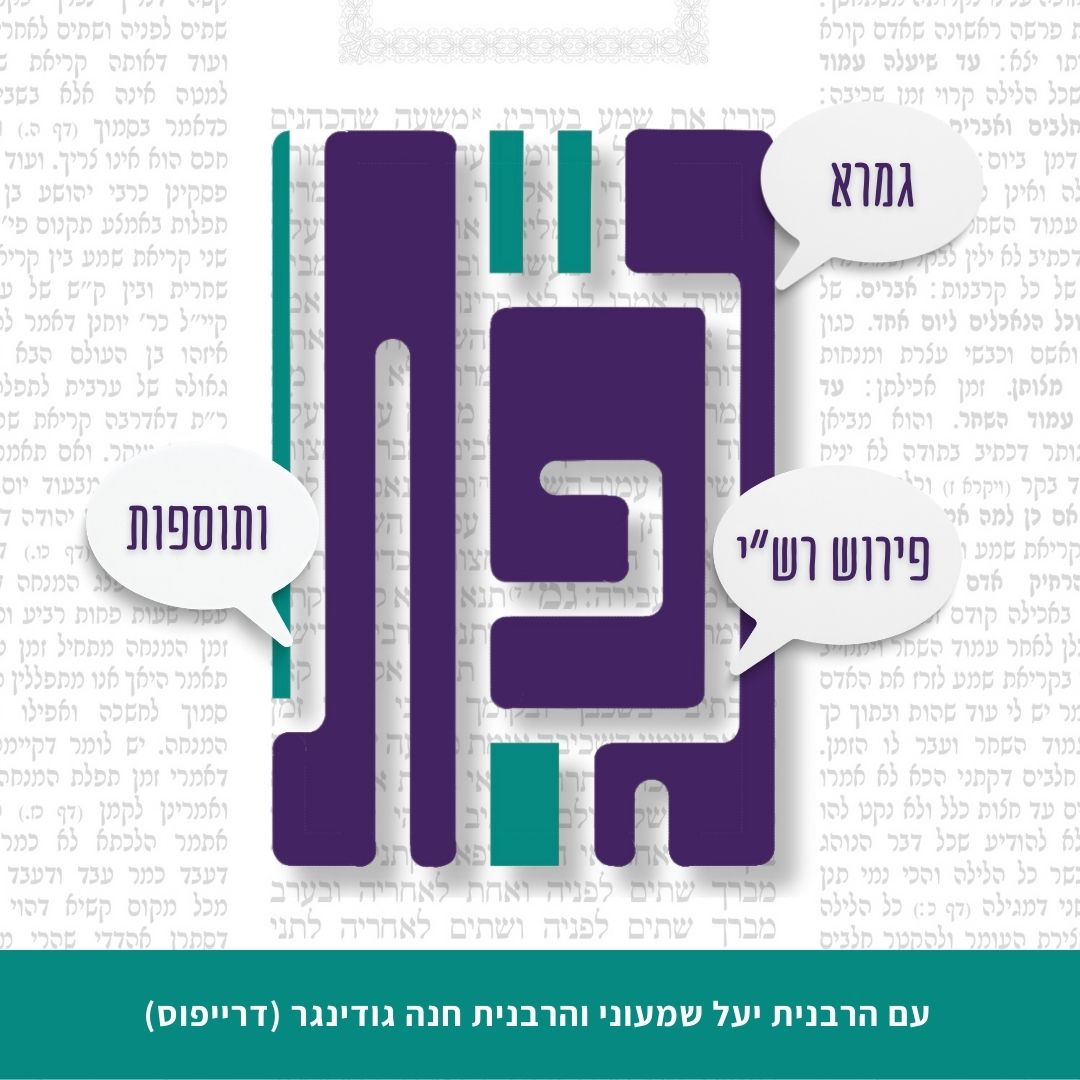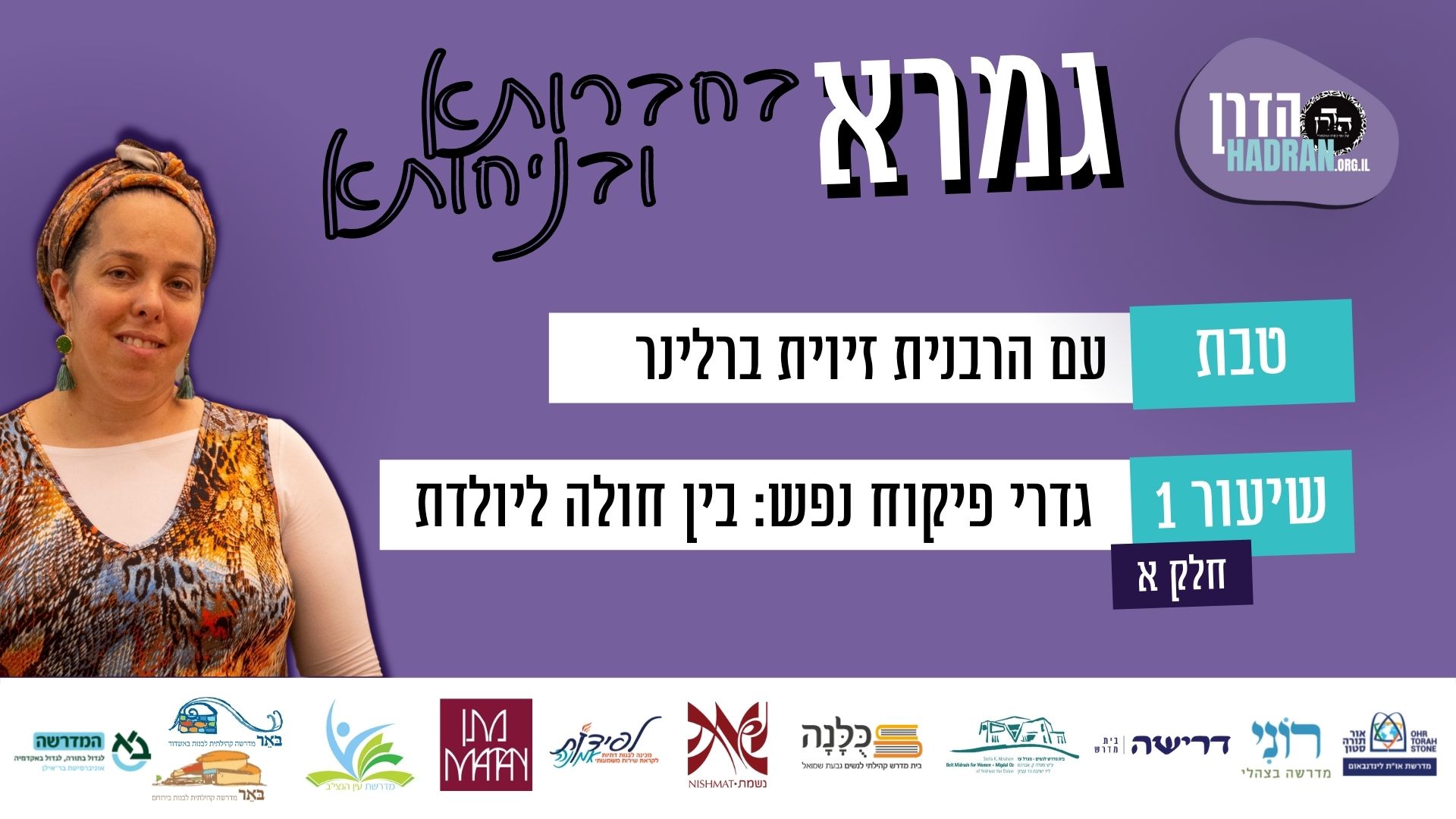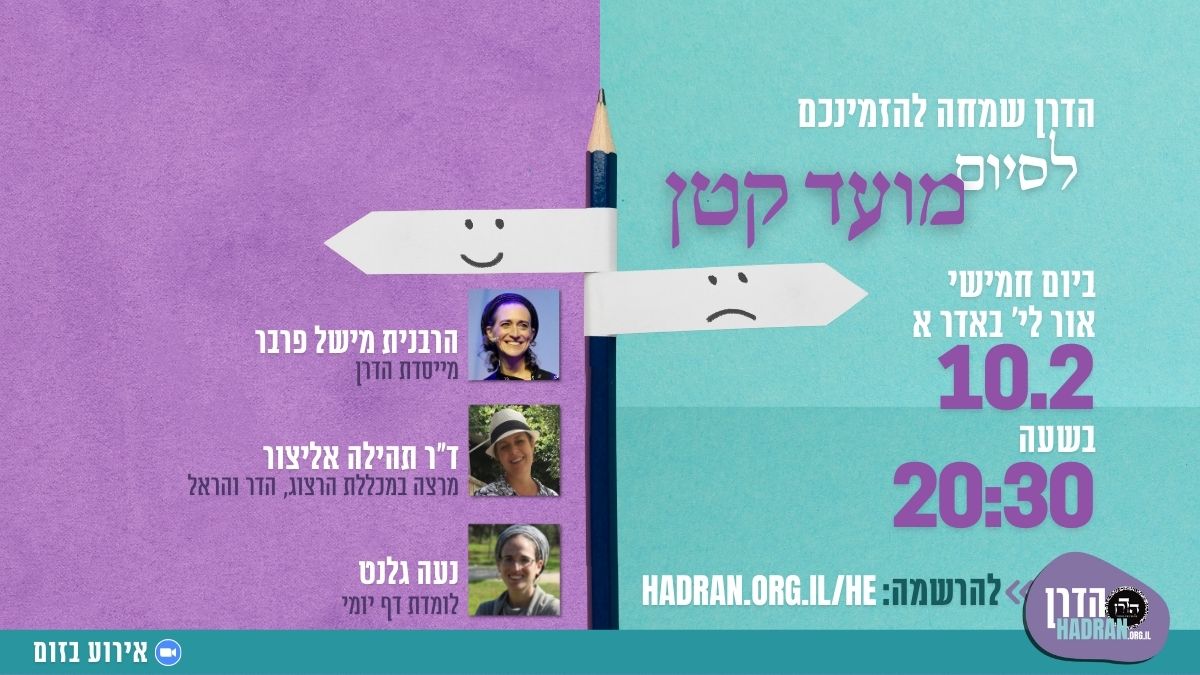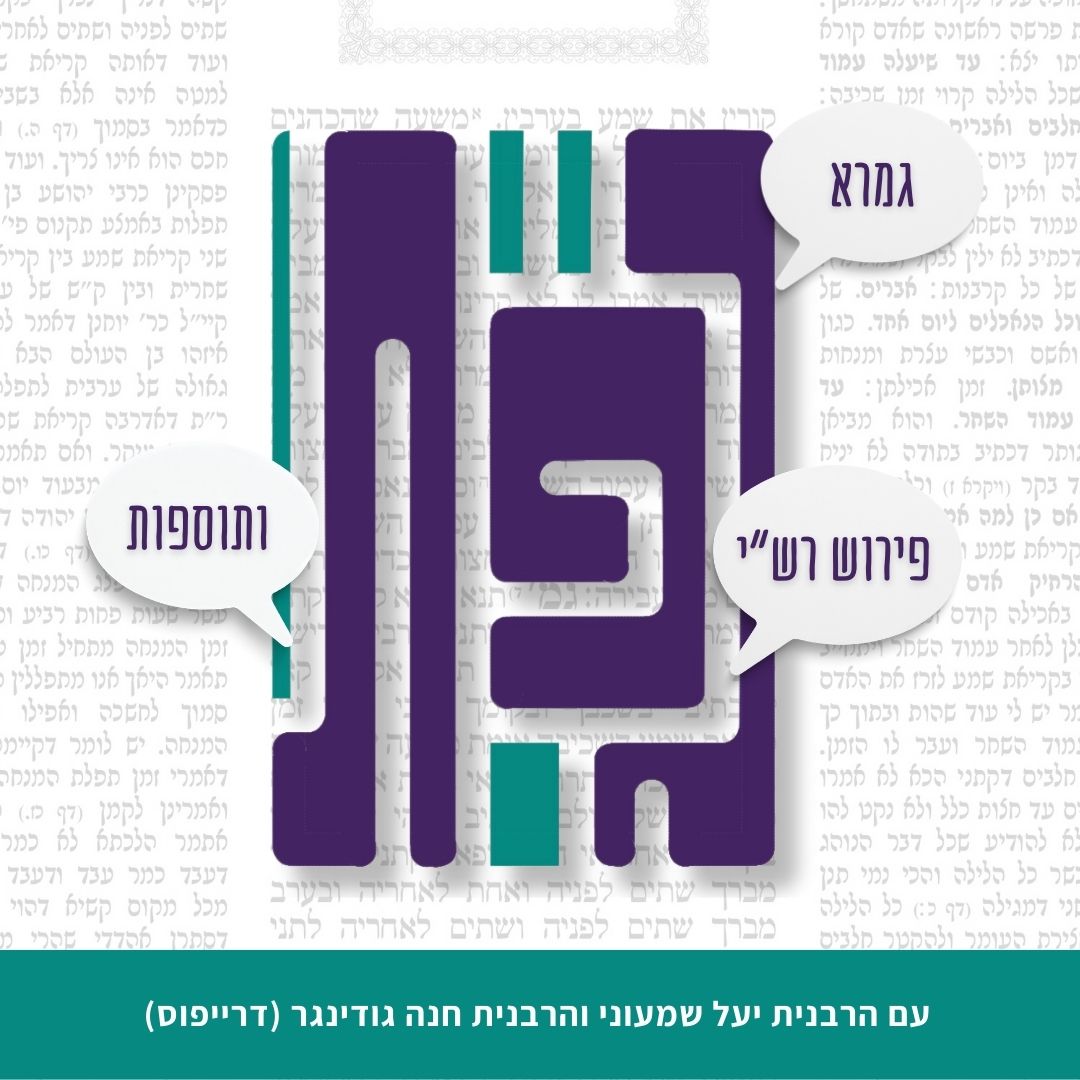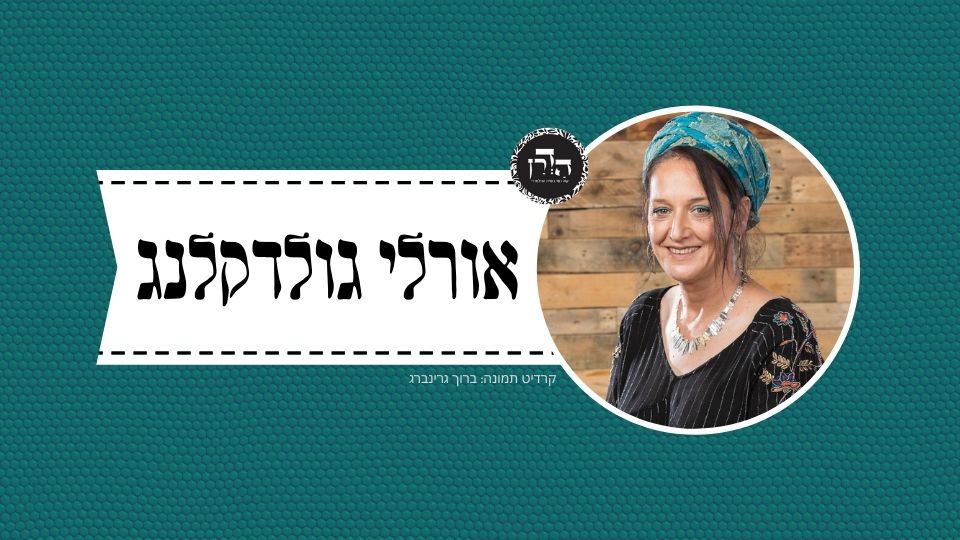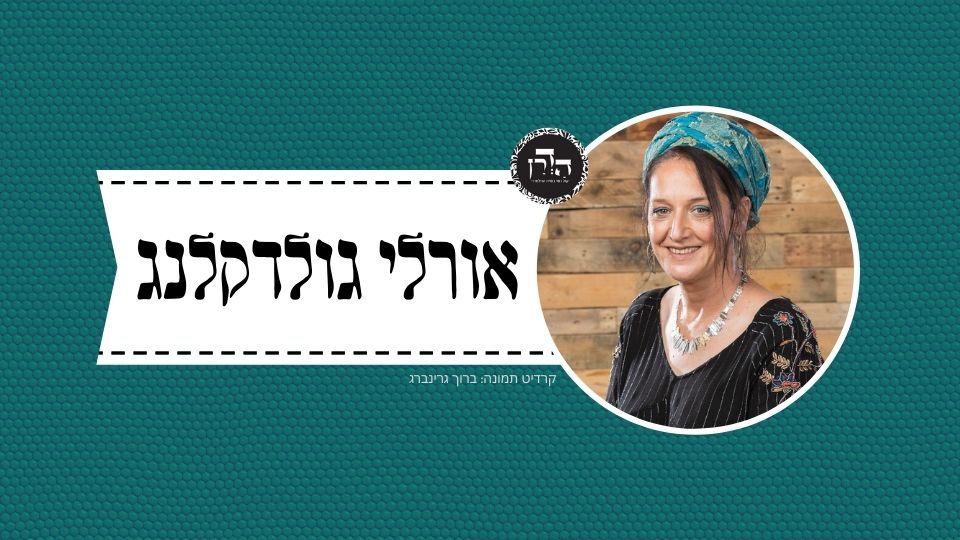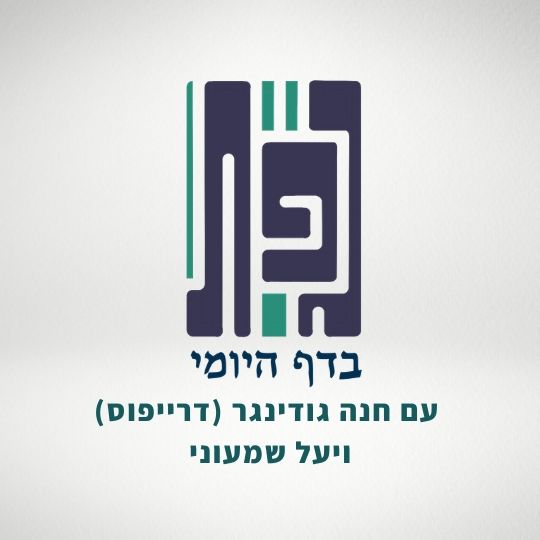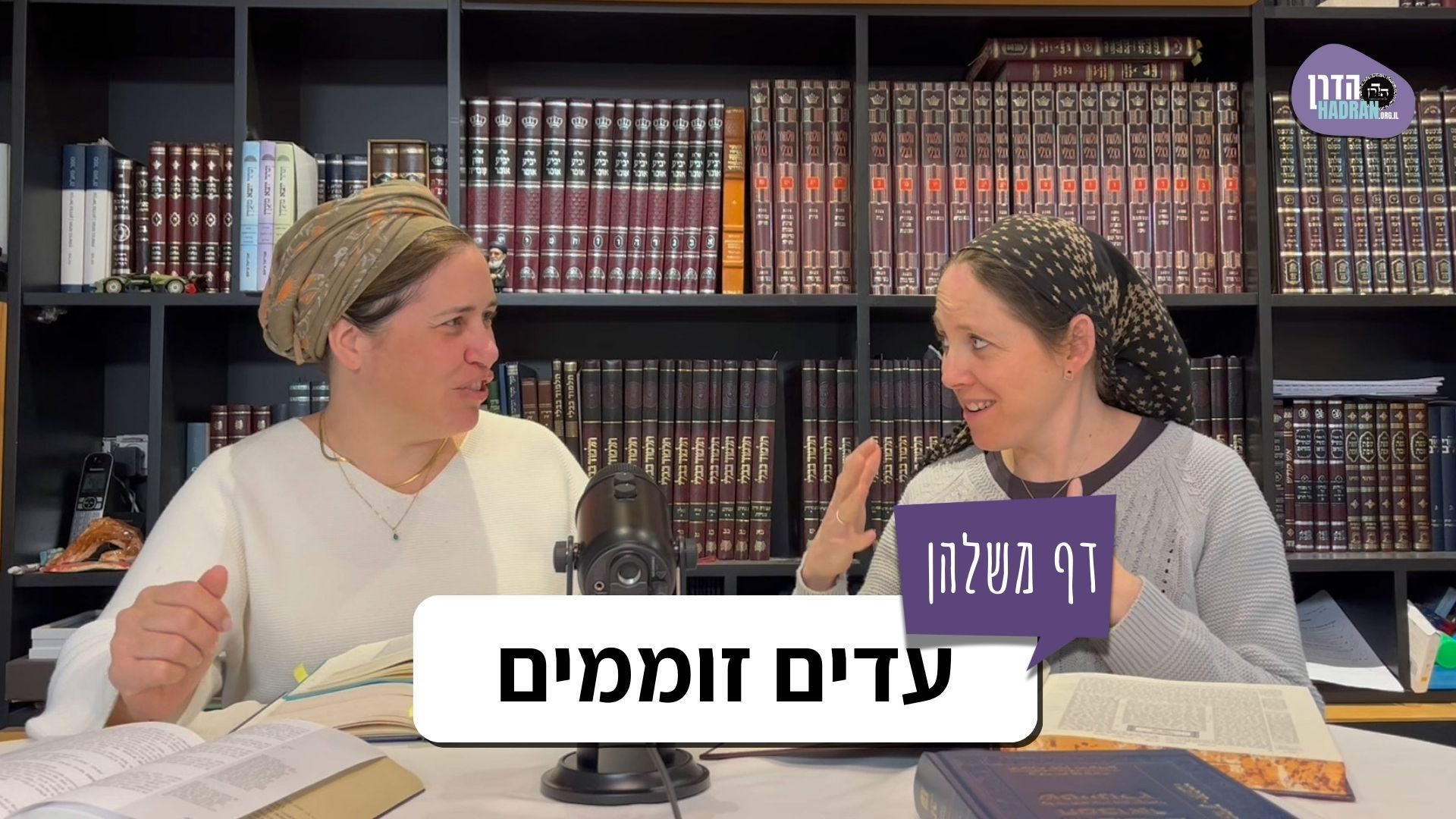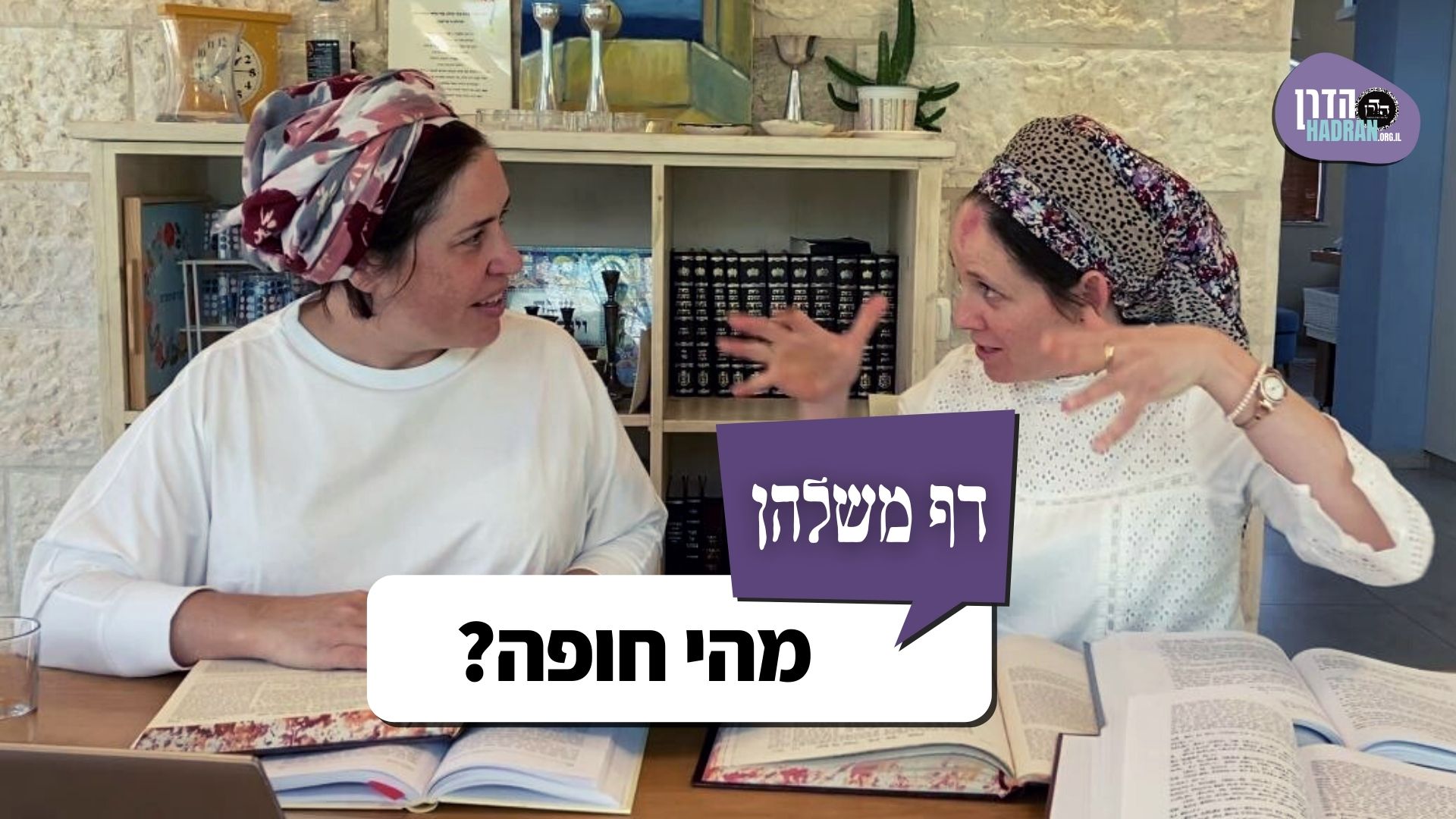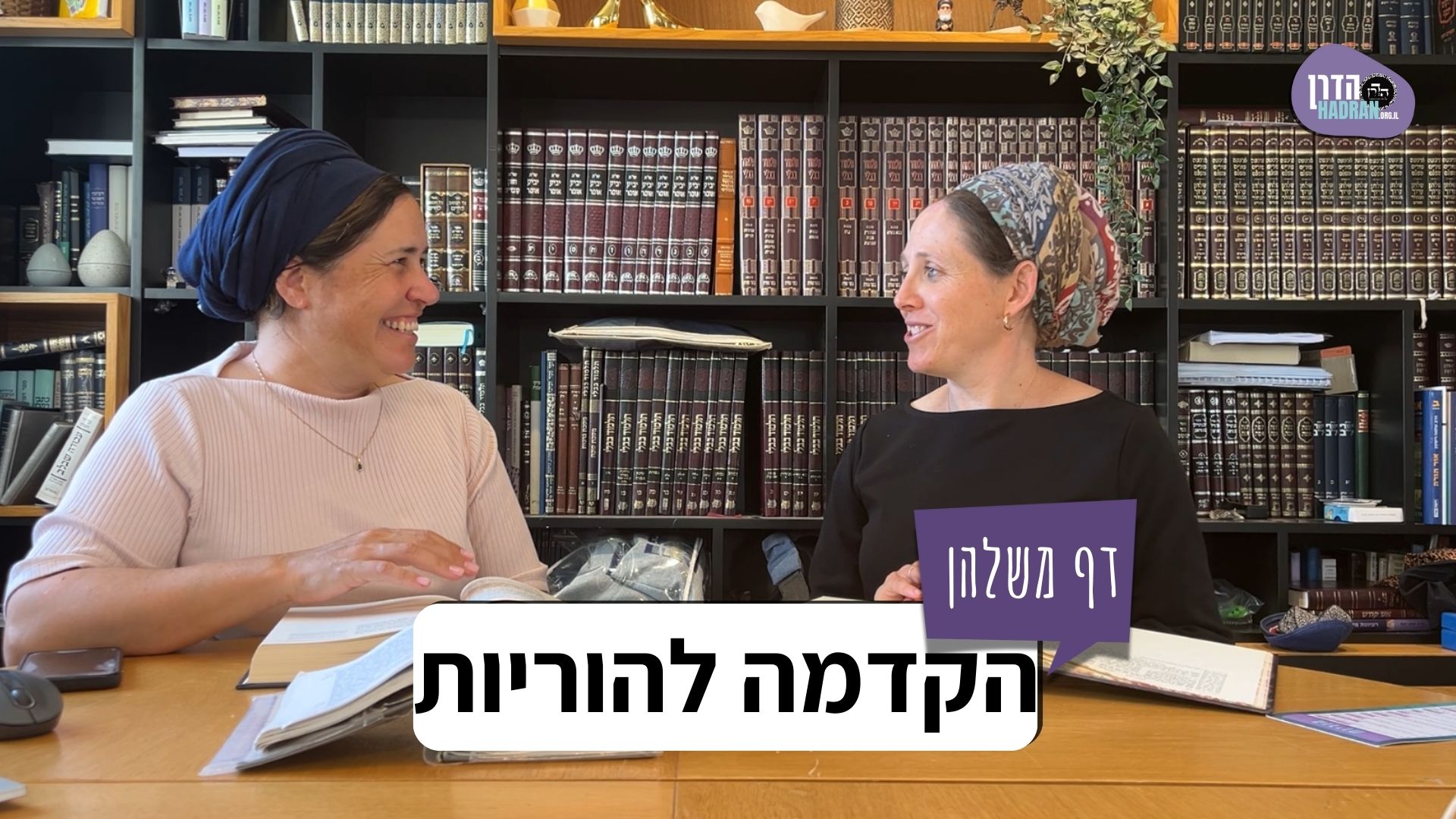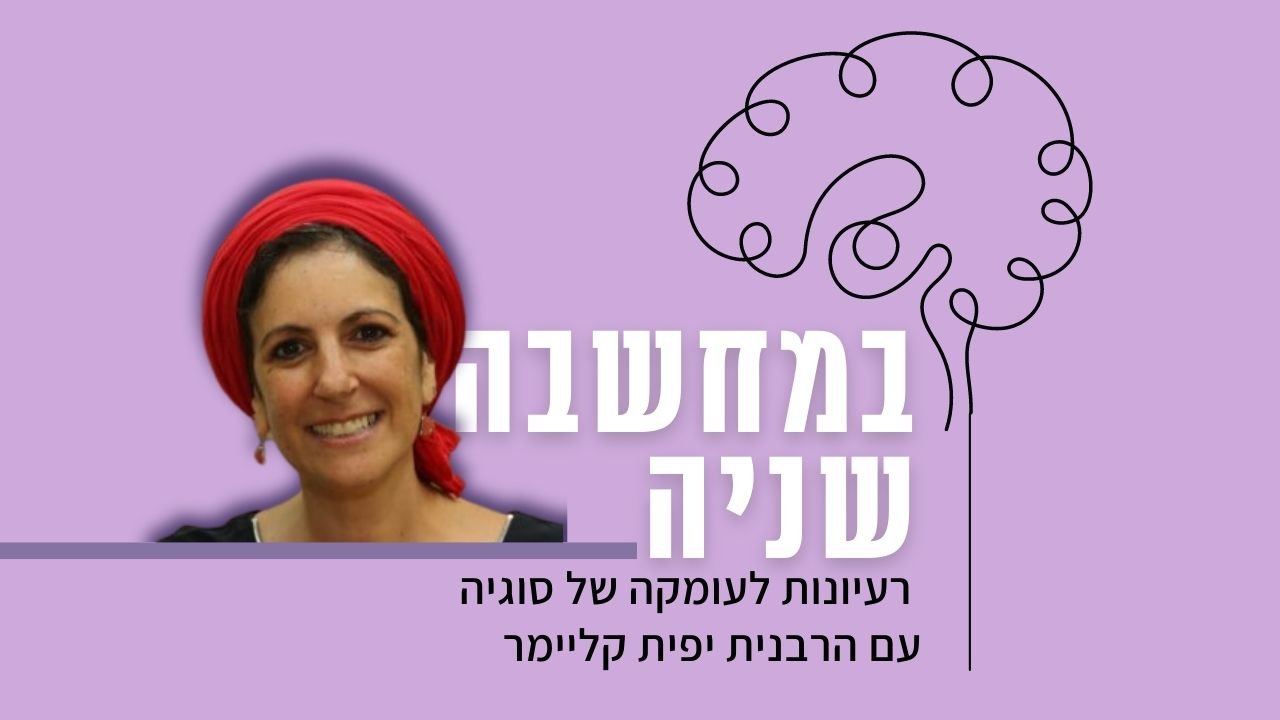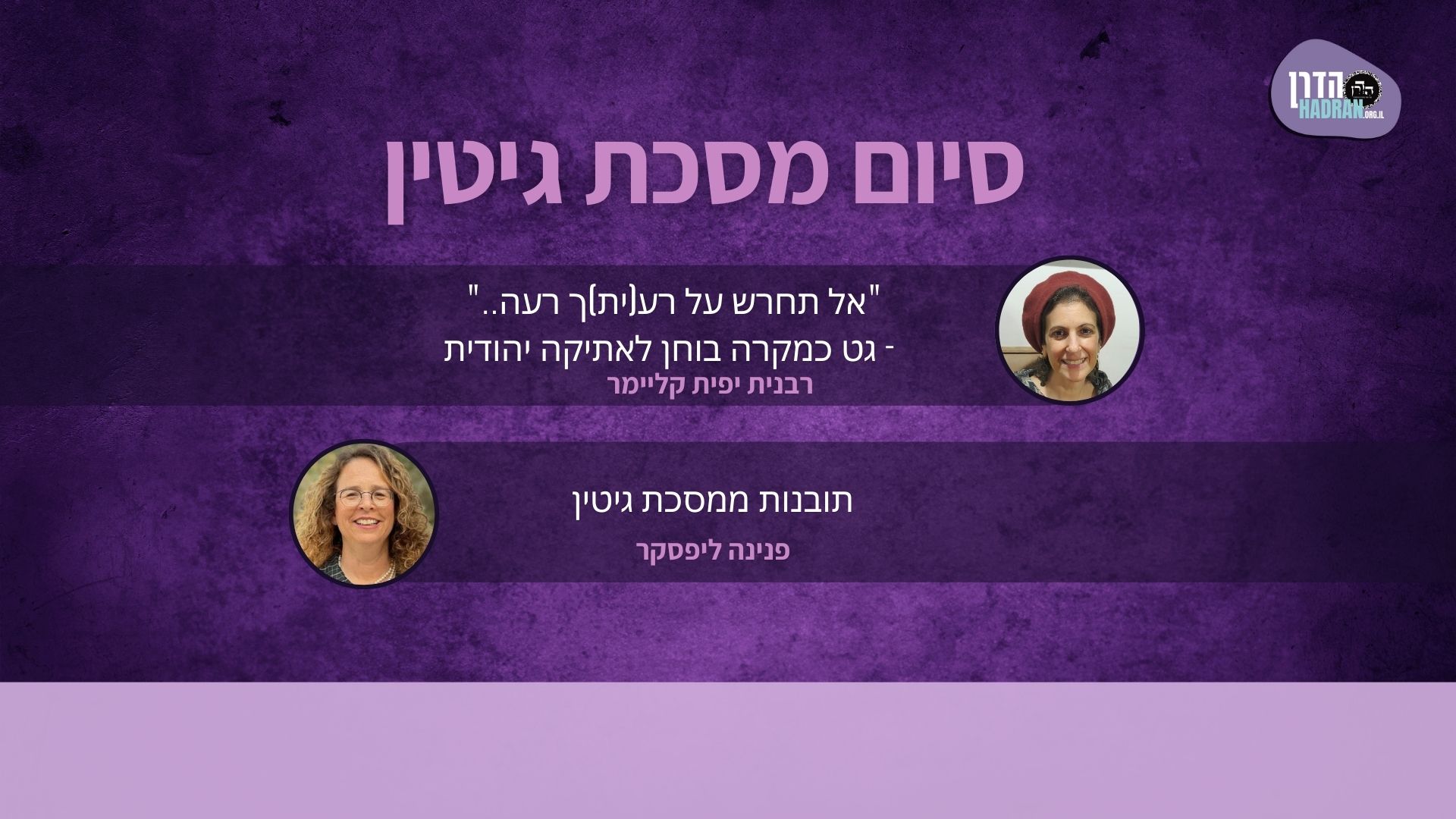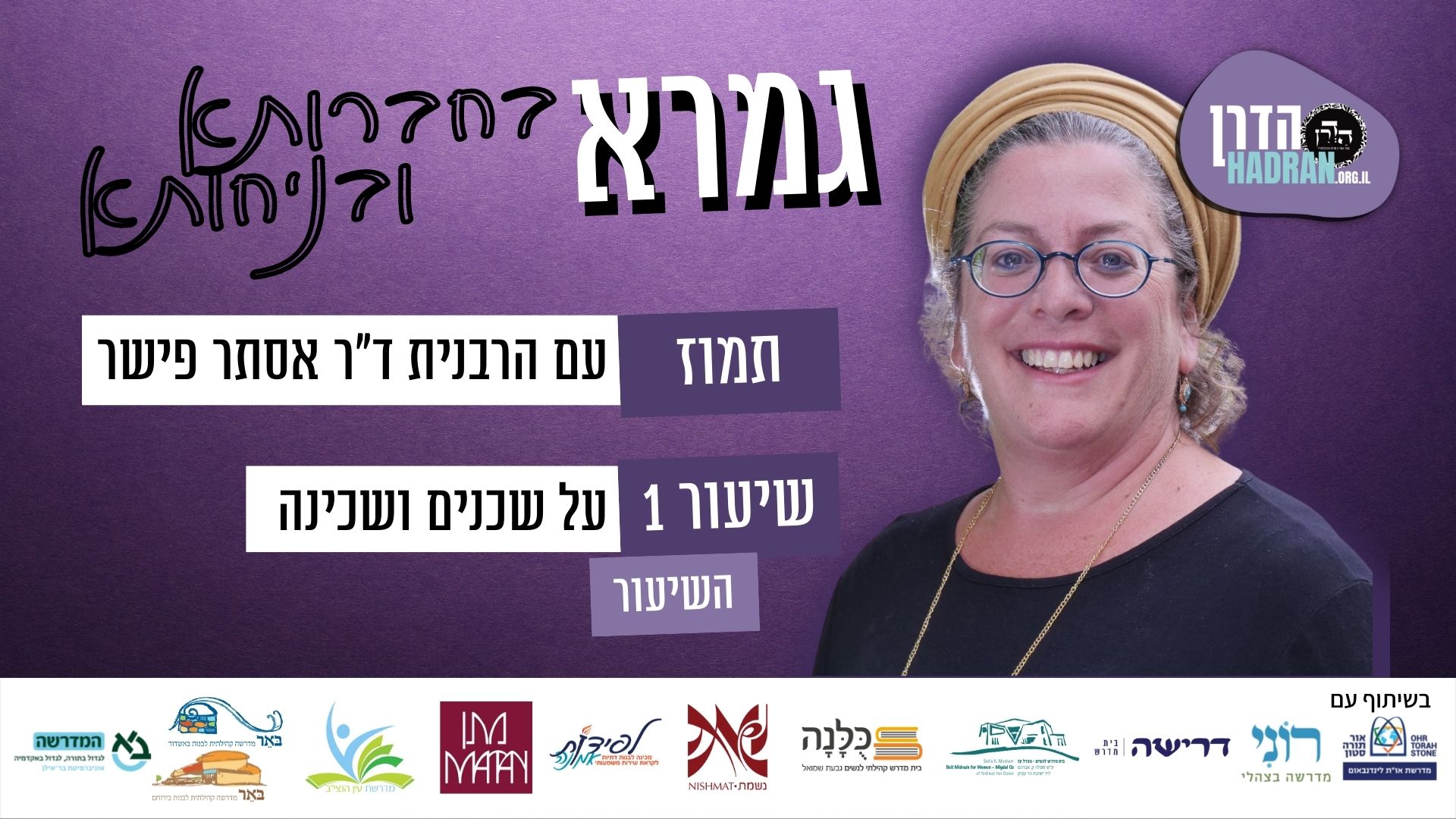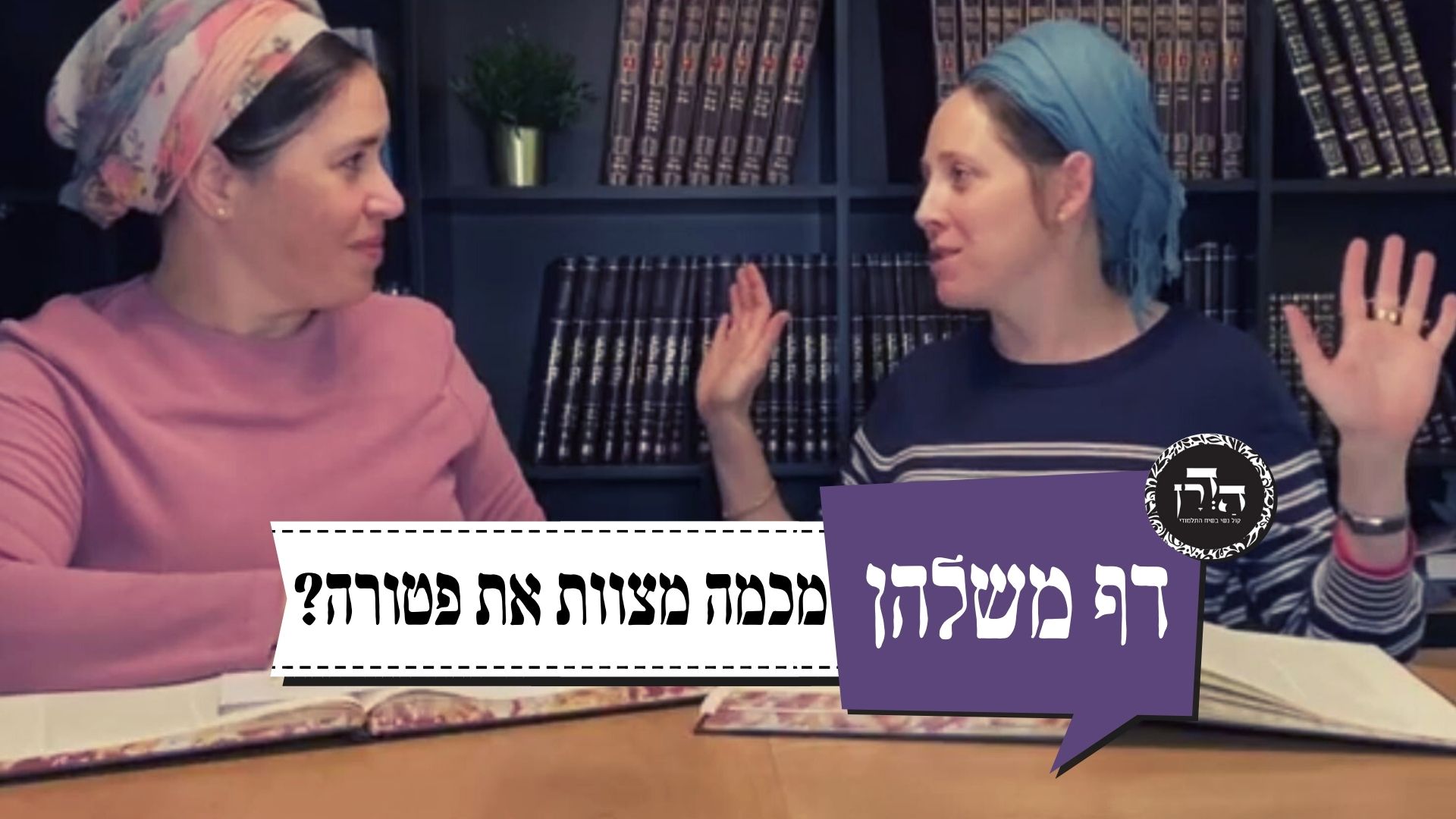הדיון ממשיך לגבי איזה דברים יש או אין בהם מעילה ובאיזה שלבים: דישון המזבח הפנימי, מה שנשאר במנורה, תורין שלא הגיע זמנם (אינם גדולים מדי להיקרב) או בני יונה שכבר עברו את הגיל שאפשר להקריבם. מה הדין לגבי חלב וביצים של בהמות מוקדשים – במה זה תלוי?
רוצה להקדיש שיעור?
כלים
העמקה
רוצה להבין מה באמת קורה מתחת לפני השטח של הסוגיה?
שיעורים, פודקאסטים והרחבות של מיטב המורות שלנו יפתחו לך עוד זוויות וכיווני חשיבה.
חדשה בלימוד הגמרא?
זה הדף הראשון שלך? איזו התרגשות עצומה! יש לנו בדיוק את התכנים והכלים שיעזרו לך לעשות את הצעדים הראשונים ללמידה בקצב וברמה שלך, כך תוכלי להרגיש בנוח גם בתוך הסוגיות המורכבות ומאתגרות.
פסיפס הלומדות שלנו
גלי את קהילת הלומדות שלנו, מגוון נשים, רקעים וסיפורים. כולן חלק מתנועה ומסע מרגש ועוצמתי.
מעילה יב
מִזְבֵּחַ הַחִיצוֹן, דִּכְתִיב בֵּיהּ: ״וְשָׂמוֹ אֵצֶל הַמִּזְבֵּחַ״. מִזְבֵּחַ הַפְּנִימִי מְנָלַן?
that the ashes of the external altar are subject to misuse, as it is written in the context of those ashes: “And he shall put it beside the altar” (Leviticus 6:3). This teaches that these ashes must be interred, despite the fact that their mitzva has been performed by its removal, and therefore they are subject to misuse. But from where do we derive that the ashes of the inner altar are also subject to misuse?
אָמַר רַבִּי אֶלְעָזָר: דְּאָמַר קְרָא: ״וְהֵסִיר אֶת מֻרְאָתוֹ בְּנֹצָתָהּ״ – אִם אֵינוֹ עִנְיָן לְמִזְבֵּחַ הַחִיצוֹן, תְּנֵהוּ עִנְיָן לְמִזְבֵּחַ הַפְּנִימִי.
Rabbi Elazar said in response: It is derived from the fact that the verse states with regard to a bird sacrificed as a burnt offering: “And he shall take away its crop with its feathers, and cast it beside the altar on the east part, in the place of the ashes” (Leviticus 1:16), referring to the location for the placement of the removed ashes. If this verse is not needed for the matter of the external altar, as that halakha is already derived from the phrase: “And he shall put them beside the altar” (Leviticus 6:3), apply it to the matter of the ashes of the inner altar, teaching that these ashes must also be placed there.
אֵימָא: אִידֵּי וְאִידֵּי בְּמִזְבֵּחַ הַחִיצוֹן, וְלִקְבּוֹעַ לוֹ מָקוֹם!
The Gemara questions this conclusion: One can say that this and that, i.e., both verses cited above, are stated with regard to the ashes that are on the external altar, and the additional verse is necessary to fix its place, i.e., that it should be put on the east part, which is mentioned only in Leviticus 1:16. If so, there is no source for the placement of the ashes of the inner altar.
אִם כֵּן, לֵימָא קְרָא: ״אֵצֶל הַמִּזְבֵּחַ״. מַאי ״הַדָּשֶׁן״? דַּאֲפִילּוּ מִזְבֵּחַ הַפְּנִימִי.
The Gemara answers: If so, that both verses are referring to the external altar, and the sole purpose of Leviticus 1:16 is to fix its place, let that verse merely state: “And he shall take away its crop with its feathers and cast it beside the altar,” and it would be understood that the two verses are referring to the same place, as the identical phrase “beside the altar” appears in the other verse. What is the reason for the additional phrase “in the place of the ashes”? It teaches that even the ashes of the inner altar are placed there.
מְנוֹרָה מְנָלַן? ״דָּשֶׁן״, ״הַדָּשֶׁן״.
The Gemara asks: From where do we derive that the ashes of the Candelabrum are also placed to the east of the altar? The Gemara answers: It is derived from the definite article in: “The ashes,” as the verse could have said “ashes” and instead it said “the ashes.” This addition serves to include the ashes of the Candelabrum.
מַתְנִי׳ רַבִּי שִׁמְעוֹן אוֹמֵר תּוֹרִין שֶׁלֹּא הִגִּיעַ זְמַנָּן – מוֹעֲלִין בָּהֶן, בְּנֵי יוֹנָה שֶׁעָבַר זְמַנָּן – לֹא נֶהֱנִין וְלֹא מוֹעֲלִין בָּהֶן.
MISHNA: The previous mishna teaches that one may not derive benefit from doves whose time of fitness for sacrifice has not arrived and from pigeons whose time of fitness for sacrifice has passed, but one who derived benefit from them is not liable for their misuse. Rabbi Shimon disagrees with this ruling and says: With regard to doves whose time of fitness for sacrifice has not arrived, one is liable for misusing them. With regard to pigeons whose time of fitness for sacrifice has passed, one may not derive benefit ab initio, but if one derived benefit from them he is not liable for their misuse.
גְּמָ׳ בִּשְׁלָמָא רַבִּי שִׁמְעוֹן, כִּדְקָתָנֵי טַעְמָא: שֶׁהָיָה רַבִּי שִׁמְעוֹן אוֹמֵר, כׇּל הָרָאוּי לְאַחַר זְמַן, וְהִקְדִּישׁוֹ בְּתוֹךְ זְמַנּוֹ – הֲרֵי הוּא בְּלֹא תַעֲשֶׂה, וְאֵין בּוֹ כָּרֵת.
GEMARA: This and the preceding mishna indicate that the Rabbis and Rabbi Shimon disagree as to whether or not doves whose time of fitness for sacrifice has not arrived are subject to misuse. The Gemara clarifies their opinions: Granted, one can understand the opinion of Rabbi Shimon, as he himself teaches his reason in a mishna (Zevaḥim 112b). As Rabbi Shimon would say: In the case of any sacrificial animal that is fit to be sacrificed after the passage of time, e.g., doves that will be fit for sacrifice when they mature, if one consecrated it before its time of fitness and slaughtered it outside the Temple courtyard, that person is in violation of a prohibition but there is no liability to receive karet for it.
אֶלָּא רַבָּנַן: מַאי שְׁנָא מִמְּחוּסַּר זְמַן?
But according to the opinion of the Rabbis, who hold that doves whose time of fitness for sacrifice has not arrived are not subject to misuse, in what way is this case different from an animal whose time has not yet arrived, and yet it can be consecrated? An animal whose time has not yet arrived enters the pen to be tithed together with the other animals (see Bekhorot 56a). Why is the case of the young doves any different?
אָמְרִי: מְחוּסַּר זְמַן – מִידֵּי דְּהָוֵה אַבַּעַל מוּם, דְּבַר פִּדְיוֹן הוּא. אֲבָל הָנֵי עוֹפוֹת, כֵּיוָן דְּאֵין מוּם פּוֹסֵל בְּעוֹפוֹת – אֵין לָעוֹפוֹת פִּדְיוֹן.
The Rabbis would say in response that the cases are not comparable. An animal whose time has not yet arrived can indeed be consecrated, just as is the halakha with regard to a blemished animal, which can be consecrated, although only to the degree that it is subject to redemption. But in the case of these birds, since a blemish does not render birds unfit, there is no possibility of redemption for blemished birds. Therefore, one cannot compare the case of animal, which is subject to redemption, to the case of a bird whose time has not yet arrived.
אָמַר עוּלָּא, אָמַר רַבִּי יוֹחָנָן: קָדָשִׁים שֶׁמֵּתוּ, יָצְאוּ מִידֵי מְעִילָה דְּבַר תּוֹרָה.
§ Ulla says that Rabbi Yoḥanan says: Sacrificial animals that died without being sacrificed are excluded from the halakhot of misuse by Torah law. This is because they are no longer fit to be sacrificed, and therefore are no longer in the category of: “The sacred items of the Lord” (Leviticus 5:15). They cannot be redeemed either, since one may not redeem sacrificial animals merely in order to feed them to the dogs.
יָתֵיב עוּלָּא וְקָאָמַר לְהָא שְׁמַעְתָּא, אֲמַר לֵיהּ רַב חִסְדָּא: מַאן שָׁמַע לָךְ וּלְרַבִּי יוֹחָנָן רַבָּךְ?! וְכִי קְדוּשָּׁה שֶׁבָּהֶן לְהֵיכָן הָלְכָה?!
The Gemara relates that Ulla was sitting in the study hall and he recited this halakha in the name of Rabbi Yoḥanan. Rav Ḥisda said to him: Who will listen to you and Rabbi Yoḥanan, your teacher, with regard to this opinion, that such offerings are not subject to the halakhot of misuse by Torah law? After all, to where has the sanctity that was inherent in them until they died gone?
אֲמַר לֵיהּ: תִּיקְשֵׁי מַתְנִיתִין: ״תּוֹרִין שֶׁלֹּא הִגִּיעַ זְמַנָּן וּבְנֵי יוֹנָה שֶׁעָבַר זְמַנָּן – לֹא נֶהֱנִין וְלֹא מוֹעֲלִין״, הָכָא נָמֵי נֵימָא: קְדוּשָּׁה שֶׁבָּהֶן לְהֵיכָן הָלְכָה?!
Ulla said to Rav Ḥisda: According to your reasoning, the mishna itself should present a difficulty, as it teaches: With regard to doves whose time of fitness for sacrifice has not arrived, as they are too young, and pigeons whose time of fitness for sacrifice has passed, as they are too old, one may not derive benefit from them ab initio, but if one derived benefit from them he is not liable for their misuse. Here too, one can say: To where has the sanctity that was inherent in the pigeons whose time of fitness for sacrifice has passed gone? Why are they no longer subject to the halakhot of misuse?
אֲמַר לֵיהּ: מוֹדֵינָא לָךְ דְּאִיכָּא מְעִילָה מִדְּרַבָּנַן. וְקַשְׁיָא לִי: מִי אִיכָּא מִידֵּי דְּמֵעִיקָּרָא לָא אִית בֵּיהּ מְעִילָה, וּלְבַסּוֹף אִית בֵּיהּ מְעִילָה?
Rav Ḥisda said to Ulla in response: I agree that both the sacrificial animals that died and the pigeons whose time of fitness for sacrifice has passed are not subject to the halakhot of misuse by Torah law. I also concede to you that in the case of sacrificial animals that died and doves whose time of fitness for sacrifice has not arrived there is a prohibition of misuse of consecrated property by rabbinic law. Accordingly, I am no longer troubled by the question of where the sanctity has gone. But there is another matter that is difficult for me: Is there anything where initially, when it was consecrated, it is not subject to the halakhot of misuse, and ultimately it is subject to the halakhot of misuse by rabbinic law, such as these doves whose time of fitness for sacrifice has not arrived?
וְלָא? וְהָא אִיכָּא דָּם, דְּמֵעִיקָּרָא לֵית בַּהּ מְעִילָה, וּלְבַסּוֹף אִית בַּהּ מְעִילָה, דִּתְנַן: דָּם, בַּתְּחִלָּה – אֵין מוֹעֲלִין בּוֹ, יָצָא לְנַחַל קִדְרוֹן – מוֹעֲלִין בּוֹ!
The Gemara asks: And is it so that there is no instance of an item that is initially not subject to the halakhot of misuse, and in the end is subject to the halakhot of misuse? But there is the case of blood, which initially is not subject to the halakhot of misuse, and ultimately it is subject to the halakhot of misuse. As we learned in the mishna (11a): With regard to blood, at its outset, before it is sprinkled on the altar, one is not liable for misusing it, but once it emerges via the canal that runs through the Temple to the Kidron Valley at the foot of the Temple Mount, one is liable for misusing it.
אָמְרִי: הָתָם נָמֵי אִיכָּא מְעִילָה מֵעִיקָּרָא,
The Sages say in response: This is not a proof, as there too, in the case of blood it is subject to the halakhot of misuse initially.
דְּאָמַר רַב: הַמַּקִּיז דָּם לְבֶהֱמַת קָדָשִׁים, אָסוּר בַּהֲנָאָה, וּמוֹעֲלִין בּוֹ.
As Rav said: In a case of one who lets blood from a live sacrificial animal, deriving benefit from that blood is prohibited and one is liable for misusing it by Torah law. Since there is a stage when there is a prohibition of misuse by Torah law, one can understand the halakha that one is liable by rabbinic law for misusing the blood ultimately, when it descended to the Kidron Valley. This is not comparable to doves whose time of fitness for sacrifice has not arrived, as they are initially not subject to misuse by Torah law.
גּוּפָא. אָמַר רַב הוּנָא, אָמַר רַב: הַמַּקִּיז דָּם לְבֶהֱמַת קָדָשִׁים – אָסוּר בַּהֲנָאָה, וּמוֹעֲלִין בּוֹ. מֵתִיב רַב הַמְנוּנָא חֲלֵב הַמּוּקְדָּשִׁין, וּבֵיצֵי תוֹרִין – לֹא נֶהֱנִין וְלֹא מוֹעֲלִין!
§ The Gemara analyzes the matter itself. Rav Huna says that Rav says: In a case of one who lets blood from a sacrificial animal, deriving benefit from that blood is prohibited and one is liable for misusing it. Rav Hamnuna raises an objection to the opinion of Rav from the mishna below: With regard to the milk of animals consecrated to be sacrificed and the eggs of doves consecrated to be sacrificed, one may not derive benefit from them ab initio, but if one derived benefit from them he is not liable for their misuse, despite the fact that one is liable for misuse of the animals and doves themselves. Apparently, the products of a consecrated item do not share its status with regard to the halakha of misuse. Why doesn’t this principle apply to blood as well?
אֲמַר לֵיהּ: כִּי קָאָמְרִינַן, לְגַבֵּי דָּם, דְּלֹא מִתְקַיֶּימֶת בְּלָא דָּם. אֲבָל חֵלֶב, דְּקָא מִקַּיְימָא בְּלֹא חֵלֶב – לָא.
Rav said to Rav Hamnuna in response: When we said the products of a consecrated item are also subject to the halakha of misuse that was only with regard to blood, as the animal cannot exist without blood and therefore the blood is considered like the animal itself. But in the case of milk, since the animal can exist without milk, the milk is not considered like the animal itself.
מֵתִיב רַב מְשַׁרְשְׁיָא: הַזֶּבֶל וְהַפֶּרֶשׁ שֶׁבֶּחָצֵר – אֵין נֶהֱנִין וְאֵין מוֹעֲלִין. וְיִפְּלוּ דָּמֶיהָ לַלִּשְׁכָּה.
Rav Mesharshiyya raises an objection to this suggestion from a baraita: One may not derive benefit from the dried manure and the fresh dung of offerings of the most sacred order found in the Temple courtyard ab initio, but if one derived benefit from them he is not liable for misusing them; and the money received from their sale will be allocated for the treasury chamber of the Temple.
אַמַּאי? הָכָא נָמֵי, לָא מְקַיֵּים בְּלֹא פֶּרֶשׁ! אָמְרִי: מַאי אִירְיָא, הָדֵין פֶּרֶשׁ דְּמִן עָלְמָא קָאָתֵי לַהּ, אָזֵיל הַאי – אָתֵי אַחֲרִינָא. לְאַפּוֹקֵי דָּם, מִגּוּפַהּ.
In light of the suggested distinction between blood and milk, the Gemara asks: Why is the dung not subject to the halakhot of misuse? Here too, the animal cannot exist without dung, and therefore the dung should be subject to the halakhot of misuse like blood. The Sages say in response: How can you compare the two cases? In the case of this dung that comes to the animal from an external source, i.e., the food that it ate, this food goes out of the body in the form of dung and that other food comes into the body and takes its place. This description serves to exclude blood, which is part of the animal’s body and is not replaced from an external source.
הָא קָתָנֵי לֹא נֶהֱנִין וְלֹא מוֹעֲלִין וְדָמָיו לַלִּשְׁכָּה. מְסַיְּיעָא לֵיהּ לְרַבִּי אֶלְעָזָר, דְּאָמַר רַבִּי אֶלְעָזָר: כׇּל מָקוֹם שֶׁאָמְרוּ חֲכָמִים קָדוֹשׁ וְאֵינוֹ קָדוֹשׁ – דָּמָיו יִפְּלוּ לַלִּשְׁכָּה.
The Gemara notes: The baraita teaches that one may not derive benefit from the manure and dung ab initio, but if one derived benefit from them he is not liable for misuse, and the money received from their sale will be allocated for the treasury chamber of the Temple. This supports the opinion of Rabbi Elazar, as Rabbi Elazar said: Wherever the Sages said an item is consecrated and not consecrated, as in this case where one may not derive benefit but he is not liable for misuse either, the money received from its sale is allocated for the treasury chamber of the Temple.
מַתְנִי׳ חֲלֵב הַמּוּקְדָּשִׁין וּבֵיצֵי תוֹרִין – לֹא נֶהֱנִין וְלֹא מוֹעֲלִין.
MISHNA: With regard to the milk of sacrificial animals and the eggs of sacrificial doves, one may not derive benefit from them ab initio, but if one derived benefit from them after the fact he is not liable for their misuse.
בַּמֶּה דְּבָרִים אֲמוּרִים – בְּקׇדְשֵׁי מִזְבֵּחַ. אֲבָל בְּקׇדְשֵׁי בֶּדֶק הַבַּיִת, הִקְדִּישׁ תַּרְנְגוֹלֶת – מוֹעֲלִין בָּהּ וּבְבֵיצָתָהּ, חֲמוֹרָה – מוֹעֲלִין בָּהּ וּבַחֲלָבָהּ.
In what case is this statement, that if one derived benefit from the eggs or milk of sacrificial animals, he is not liable for their misuse, said? It is stated in the case of sacrificial animals offered on the altar, as their eggs and milk are not brought to the altar and therefore they are considered distinct from the offerings themselves. But this is not the halakha in the case of animals that are not sacrificed and are consecrated only for Temple maintenance. For example, if one consecrated a hen he is liable for misusing it and for misusing its egg; if one consecrated a donkey he is liable for misusing it and for misusing its milk, as the animal and its milk, and likewise the hen and its eggs, are both consecrated for Temple maintenance and are deemed a single unit.
גְּמָ׳ אֶלָּא גַּבֵּי מִזְבֵּחַ, כִּי אַקְדְּשַׁהּ קְדוּשַּׁת דָּמִים, לָא אִית בַּהּ מְעִילָה?
GEMARA: The mishna teaches that if one derived benefit from the eggs or milk of consecrated animals sacrificed on the altar he is not liable for their misuse. The Gemara asks: But does that mean that in a case of an item that is suitable to be sacrificed on the altar, if he consecrated it with a sanctity that inheres in its value, i.e., to sell it and use the money to buy an offering rather than sacrifice the animal itself, then its eggs or milk are not subject to the halakhot of misuse? Since he does not intend to sacrifice the animal itself, why shouldn’t the prohibition of misuse apply to its milk or its eggs?
אָמַר רַב פָּפָּא: חַסּוֹרֵי מִיחַסְּרָא וְהָכִי קָתָנֵי: בַּמֶּה דְּבָרִים אֲמוּרִים – כְּשֶׁהִקְדִּישׁ קְדוּשַּׁת הַגּוּף לְגַבֵּי מִזְבֵּחַ, אֲבָל הִקְדִּישׁוֹ קְדוּשַּׁת דָּמִים לְגַבֵּי מִזְבֵּחַ – נַעֲשָׂה כְּמִי שֶׁהִקְדִּישׁוֹ לְבֶדֶק הַבַּיִת. הִקְדִּישׁ תַּרְנְגוֹלֶת – מוֹעֲלִין בָּהּ וּבְבֵיצָתָהּ, חֲמוֹרָה – מוֹעֲלִין בָּהּ וּבַחֲלָבָהּ.
Rav Pappa said: The wording of the mishna is incomplete and this is what it is teaching: In what case is this statement, that the milk and eggs of a consecrated animal sacrificed on the altar are not subject to misuse, said? It is said when he consecrated the animal with inherent sanctity to be sacrificed on the altar. But if he consecrated it with a sanctity that inheres in its value, i.e., to sell it and use the money to buy an offering to be sacrificed on the altar, then it is considered as though he consecrated it for the Temple maintenance and it is subject to misuse. Therefore, if one consecrated a hen to sell it and use the money to buy an offering he is liable for misusing it and for misusing its egg; if one consecrated a donkey he is liable for misusing it and for misusing its milk.
מַתְנִי׳, כׇּל הָרָאוּי לַמִּזְבֵּחַ
MISHNA: With regard to any consecrated item that is fit for sacrifice on the altar

